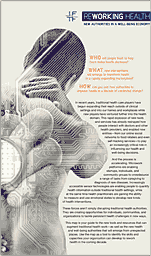Future Now
The IFTF Blog
Reworking Health: Contextualizing Science in Retail Settings
 Retail settings create direct-to-consumer health innovations
Retail settings create direct-to-consumer health innovations
In the next decade, people are going to have more information about their health. Lots more information about their health. Self-tracking devices, like fitness trackers, blood pressure and heart rate monitors, and smart scales, are widely available in retail stores today. And IMS Research, the leading provider of market research and to the electronics industry, estimates that in the next five years, there will be over 250 million health tracking devices shipped to consumers. Not to mention the (controversial) rise of direct-to-consumer genetic testing, or the possibility of microbe-sensing smart phones.
All of these will generate health information outside the context of the clinic in great quantities. And this raises an important question, how are we going to make sense of this information? Who is going to put it in context for us? One answer might be the clerk at your local retail store. Because, though they’ve been struggling to stay relevant in recent years, brick-and-mortar retailers can provide something that’s hard to get from online retail, (or from many medical clinics for that matter): an unhurried conversation with a real, live human-being.
A couple years back, we learned of a rare retail success story. Marbles, a store that sells brain fitness products almost exclusively, opened their first retail store in the fall 2008, (which, we all know, was not the best time to launch a retail business, or any business for that matter). However, they did great business in their first year, and have kept expanding. From its opening through 2011, revenue tripled every year, growing from 250 thousand to 9 million over that period.
Now, most of the products in its stores can easily be purchased online. On the surface, there isn’t much reason to walk into a physical store to buy a brain training game, (they’re not perishable, you don’t need to try them on). But the stores are staffed with brain coaches that help the customers understand the neuroscience behind the products and how they can use them to reach their brain fitness goals. And that just might be the key to the store’s success.
In the next decade, as we generate more and more health data, and the gap between information and meaning increases, we could see retail employees become a key part of our health ecosystem. To some, the idea of a clerk at a retailer discussing your health with you might be off-putting. But the constraints and priorities of the current medical system have caused at least one doctor to posit that Starbucks barista’s are better trained to deal with high-stakes emotional issues than medical professionals. One solution would be, of course, to make doctors more like service industry workers. But in the next decade, we may see service industry workers become more like doctors as well.
In our 2013 Health Horizons research, Reworking Health, we examined four emerging sources of authority—computation, narratives, networks, and ambience—that will fundamentally transform who we trust and what interventions will be available in a rapidly expanding health and well-being marketplace.
This series of blog posts dives into the map's forecasts to reveal new opportunities and help you imagine what skills and capacities you or your organization can develop to rework health in the coming decade:
- Automating Media Therapy
- Amplifying the Positive
- Commoditizing Bodywork
- Optimizing the Care Effect
- Uncovering Empowering Identities
- Coordinating Caring Communities
- Calibrating Pain
- Embedding Care Protocol Adherence
About IFTF's Health Horizons Program
- Contact Dawn Alva at [email protected] or 650-233-9585



